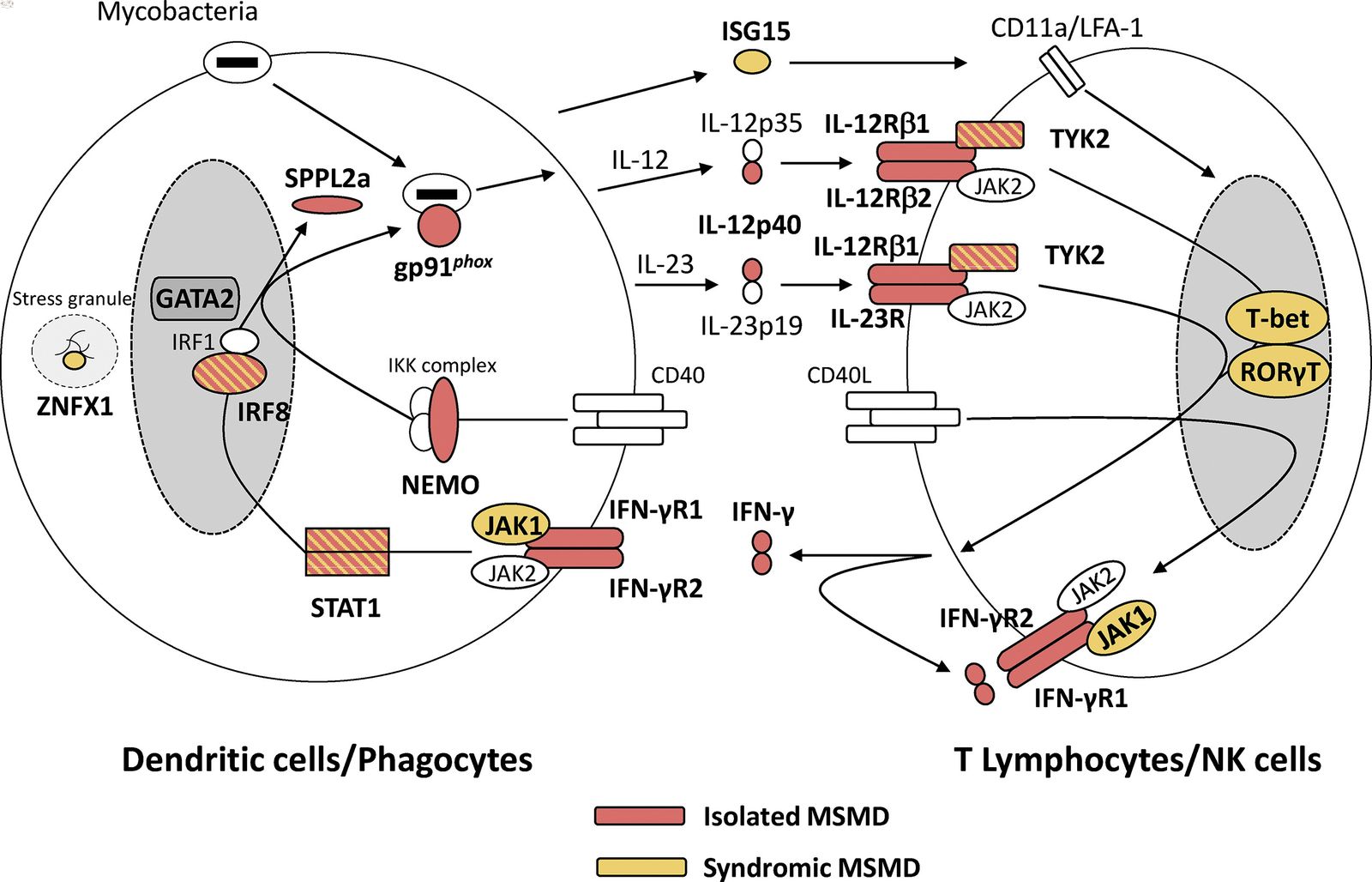
Mendelian Susceptibility to Atypical Mycobacteria (MSMD) is a rare genetic disorder that makes individuals more prone to infections by certain types of mycobacteria. These aren't the usual tuberculosis or leprosy bacteria but rather less common ones found in the environment. MSMD results from mutations in genes that are crucial for the immune system to function properly. People with this condition often face recurrent infections that can be severe and challenging to treat. Understanding MSMD can help in early diagnosis and better management of the condition. Here are 25 facts that shed light on this intriguing genetic disorder.
Key Takeaways:
- Mendelian Susceptibility to Atypical Mycobacteria (MSMD) is a rare genetic disorder affecting the immune system's ability to fight infections, making individuals more prone to certain types of mycobacteria and other infections.
- Symptoms of MSMD can include recurrent infections, skin and lung infections, swollen lymph nodes, fever, and weight loss. Diagnosis requires a combination of clinical evaluation, laboratory tests, and genetic testing. Treatment focuses on managing infections and supporting the immune system.
What is Mendelian Susceptibility to Atypical Mycobacteria?
Mendelian Susceptibility to Atypical Mycobacteria (MSMD) is a rare genetic disorder. It affects the immune system, making individuals more prone to infections by certain types of mycobacteria. These mycobacteria are usually harmless to people with normal immune function.
-
MSMD is a primary immunodeficiency disorder. This means it is present from birth and affects the immune system's ability to fight infections.
-
The condition is caused by mutations in specific genes. These genes are involved in the immune response to mycobacteria.
-
MSMD can be inherited in different ways. It can follow autosomal dominant, autosomal recessive, or X-linked inheritance patterns.
-
People with MSMD are particularly susceptible to non-tuberculous mycobacteria. These are mycobacteria that do not cause tuberculosis or leprosy.
-
The disorder can also make individuals more vulnerable to certain other infections. These include infections by Salmonella and certain viruses.
Symptoms of MSMD
Symptoms of MSMD can vary widely. They often depend on the specific genetic mutation and the types of infections encountered.
-
Recurrent infections are a common symptom. These infections can be severe and difficult to treat.
-
Skin infections are frequent in MSMD patients. These can include abscesses and granulomas.
-
Lung infections are also common. These can lead to chronic lung disease if not properly managed.
-
Lymphadenitis, or swollen lymph nodes, is another symptom. This is often due to mycobacterial infections.
-
Fever and weight loss can occur. These symptoms are usually related to ongoing infections.
Diagnosis of MSMD
Diagnosing MSMD can be challenging. It often requires a combination of clinical evaluation, laboratory tests, and genetic testing.
-
A detailed medical history is crucial. This helps identify patterns of recurrent infections.
-
Blood tests can reveal abnormalities in immune function. These tests can measure levels of different immune cells and proteins.
-
Genetic testing is essential for a definitive diagnosis. This can identify mutations in the genes associated with MSMD.
-
Skin tests may be used to assess the immune response. These tests involve injecting small amounts of antigens under the skin.
-
Imaging studies, like X-rays or CT scans, can help identify infections. These are particularly useful for detecting lung infections.
Treatment Options for MSMD
Treatment for MSMD focuses on managing infections and supporting the immune system. There is no cure for the disorder itself.
-
Antibiotics are commonly used to treat bacterial infections. These may need to be taken for long periods.
-
Antifungal and antiviral medications may also be necessary. These help manage infections caused by fungi and viruses.
-
Immunotherapy can be beneficial. This involves treatments that boost or modify the immune system's response.
-
Bone marrow transplants are a potential treatment. This can replace defective immune cells with healthy ones from a donor.
-
Regular monitoring is important. This helps detect and treat infections early, preventing complications.
Living with MSMD
Living with MSMD requires careful management and lifestyle adjustments. Support from healthcare providers and family is crucial.
-
Preventive measures are important. These include avoiding exposure to potential sources of infection.
-
Good hygiene practices can reduce the risk of infections. This includes regular handwashing and proper wound care.
-
Vaccinations may be recommended. However, live vaccines are usually avoided due to the risk of infection.
-
Nutritional support can help maintain overall health. A balanced diet supports the immune system and overall well-being.
-
Psychological support is also important. Living with a chronic condition can be challenging, and mental health care can improve quality of life.
Final Thoughts on Mendelian Susceptibility to Atypical Mycobacteria
Mendelian Susceptibility to Atypical Mycobacteria (MSMD) is a rare genetic condition that affects the immune system's ability to fight off certain infections. Understanding MSMD can help in early diagnosis and better management of the condition. Key facts include its genetic basis, the role of specific genes like IFNGR1 and IL12RB1, and the importance of early detection. Treatments often involve antibiotics and sometimes bone marrow transplants. Awareness of MSMD can lead to improved outcomes for those affected. By knowing the symptoms and genetic factors, healthcare providers can offer more targeted care. This knowledge empowers families and patients to seek appropriate medical advice and interventions. Stay informed, and always consult healthcare professionals for personalized guidance.
Frequently Asked Questions
Was this page helpful?
Our commitment to delivering trustworthy and engaging content is at the heart of what we do. Each fact on our site is contributed by real users like you, bringing a wealth of diverse insights and information. To ensure the highest standards of accuracy and reliability, our dedicated editors meticulously review each submission. This process guarantees that the facts we share are not only fascinating but also credible. Trust in our commitment to quality and authenticity as you explore and learn with us.
